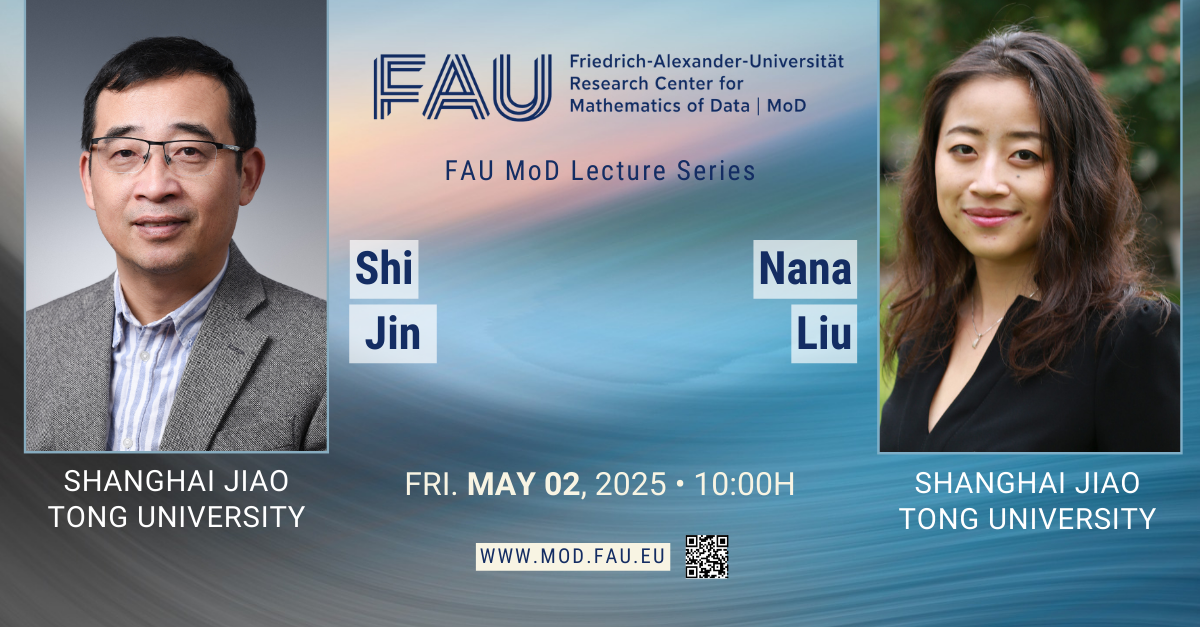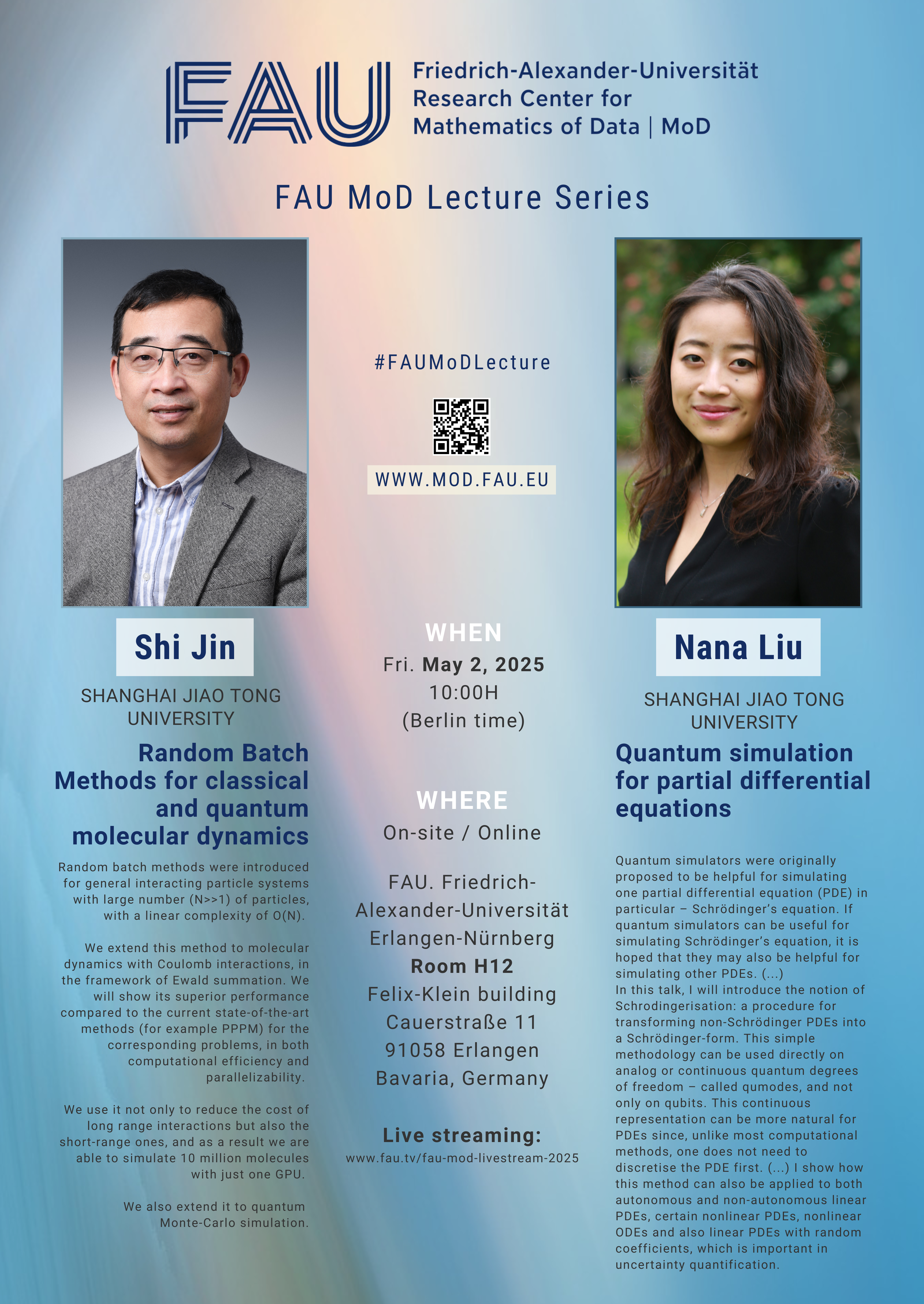Date: Fri. May 2, 2025
Event: FAU MoD Lecture Series (double session) May 2025
Organized by: FAU MoD, the Research Center for Mathematics of Data at Friedrich-Alexander-Universität Erlangen-Nürnberg (Germany)
Session 01: 10:00H
FAU MoD Lecture: Random Batch Methods for classical and quantum molecular dynamics
Speaker: Prof. Dr. Shi Jin
Affiliation: SJTU, Shanghai Jiao Tong University (China)
Abstract. Random batch methods were introduced for general interacting particle systems with large number (N>>1) of particles, with a linear complexity of O(N). We extend this method to molecular dynamics with Coulomb interactions, in the framework of Ewald summation. We will show its superior performance compared to the current state-of-the-art methods (for example PPPM) for the corresponding problems, in both computational efficiency and parallelizability. We use it not only to reduce the cost of long range interactions but also the short-range ones, and as a result we are able to simulate 10 million molecules with just one GPU. We also extend it to quantum Monte-Carlo simulation.
Session 02: 10:50H
FAU MoD Lecture: Quantum simulation for partial differential equations
Speaker: Prof. Dr. Nana Liu
Affiliation: SJTU, Shanghai Jiao Tong University (China)
Abstract. Quantum simulators were originally proposed to be helpful for simulating one partial differential equation (PDE) in particular – Schrodinger’s equation. If quantum simulators can be useful for simulating Schrodinger’s equation, it is hoped that they may also be helpful for simulating other PDEs. As with large-scale quantum systems, classical methods for other high-dimensional and large-scale PDEs often suffer from the curse-of-dimensionality (costs scale exponentially in the dimension D of the PDE), which a quantum treatment might in certain cases be able to mitigate. To enable simulation of PDEs on quantum devices that obey Schrodinger’s equations, it is crucial to first develop good methods for mapping other PDEs onto Schrodinger’s equations.
In this talk, I will introduce the notion of Schrodingerisation: a procedure for transforming non-Schrodinger PDEs into a Schrodinger-form. This simple methodology can be used directly on analog or continuous quantum degrees of freedom – called qumodes, and not only on qubits. This continuous representation can be more natural for PDEs since, unlike most computational methods, one does not need to discretise the PDE first. In this way, we can directly map D-dimensional linear PDEs onto a (D + 1)-qumode quantum system where analog Hamiltonian simulation on (D + 1) qumodes can be used. This makes these algorithms amenable to more near-term quantum analog simulation methods that would otherwise be too difficult for current qubit-based quantum systems.
I show how this method can also be applied to both autonomous and non-autonomous linear PDEs, certain nonlinear PDEs, nonlinear ODEs and also linear PDEs with random coefficients, which is important in uncertainty quantification.
OUR SPEAKERS
Shi Jin is the Director of Institute of Natural Sciences, and Chair Professor of Mathematics, at Shanghai Jiao Tong University. He was a department chair and Vilas Distinguished Achievement Professor at University of Wisconsin-Madison, and Chair of Department of Mathematics at Shanghai Jiao Tong University. He also serves as a co-director of the Shanghai National Center for Applied Mathematics, director of Ministry of Education Key Lab on Scientific and Engineering Computing, and director of Shanghai Jiao Tong University Chongqing Artificial Intelligence Institute.
He is an inaugural Fellow of the American Mathematical Society (AMS) (2012), a Fellow of Society of Industrial and Applied Mathematics (SIAM) (2013), an inaugural Fellow of the Chinese Society of Industrial and Applied Mathematics (CSIAM) (2020), and an Invited Speaker at the International Congress of Mathematicians in 2018. In 2021 he was elected a Foreign Member of Academia Europaea and a Fellow of European Academy of Sciences. In 2024 he won a
Shanghai Natural Science Prize (first class) for his works in random batch methods for interacting particle systems and molecular dynamics. His research interests include scientific computing, computational physics, machine learning and quantum computing, etc.
Nana Liu is an associate professor and PI of the Quantum Information and Technologies (QIT) group in Shanghai Jiao Tong University. She received her PhD from the University of Oxford as a Clarendon Scholar and is a 2019 recipient of the MIT Technology Review’s 10 Innovators under 35 in the Asia-Pacific region. Her research focus is on employing quantum resources for quantum computation, with a current focus on quantum algorithms for scientific computing.
AUDIENCE
This is a hybrid event (On-site/online) open to: Public, Students, Postdocs, Professors, Faculty, Alumni and the scientific community all around the world.
WHEN
Fri. May 2, 2025 at 10:00H (Berlin time)
WHERE
On-site / Online
[On-site] Friedrich-Alexander-Universität Erlangen-Nürnberg.Room H12. Felix-Klein Building. Department Mathematik.
Cauerstraße 11, 91058 Erlangen [Online] https://www.fau.tv/fau-mod-livestream-2025
Link to share this event: https://go.fau.de/1beh-
You might like:
• FAU MoD Lectures
• Upcoming events
• FAU MoD Lecture: Optimization-based control for large-scale and complex systems: When and why does it work? by Prof. Dr. Lars Grüne
• FAU MoD Lecture: Do you think you understand sex and death? Why predictions about biological processes require more than just intuition by Prof. Dr. Hanna Kokko
• FAU MoD Lecture: FAU MoD Lecture. Special December 2024 by Prof. Dr. Holger Rauhut and Prof. Dr. Christian Bär
• FAU MoD Lecture: Measuring productivity and fixedness in lexico-syntactic constructions by Prof. Dr. Stephanie Evert
• FAU MoD Lecture: New avenues for the interaction of computational mechanics and machine learning by Prof. Dr. Paolo Zunino
• FAU MoD Lecture: Discovering and Communicating Excellence by Prof. Dr. Ute Klammer
• FAU MoD Lecture: Thoughts on Machine Learning by Prof. Dr. Rupert Klein
• FAU MoD Lecture: Using system knowledge for improved sample efficiency in data-driven modeling and control of complex technical systems by Prof. Dr. Sebastian Peitz
• FAU MoD Lecture: Image Reconstruction – The Dialectic of Modelling and Learning by Prof. Dr. Martin Burger
• FAU MoD Lecture: The role of Artificial Intelligence in the future of mathematics by Prof. Dr. Amaury Hayat
• FAU MoD Lecture: FAU MoD Lecture. Special November 2023 by Prof. Dr. Michael Kohlhase and Prof. Dr. Edriss S. Titi
• FAU MoD Lecture: Free boundary regularity for the obstacle problem by Prof. Dr. Alessio Figalli
• FAU MoD Lecture: Physics-Based and Data-Driven-Based Algorithms for the Simulation of the Heart Function by Prof. Dr. Alfio Quarteroni
• FAU MoD Lecture: From Physics-Informed Machine Learning to Physics-Informed Machine Intelligence: Quo Vadimus? by Prof. Dr. George Karniadakis
• FAU MoD Lecture: From Alan Turing to contact geometry: Towards a “Fluid computer” by Prof. Dr. Eva Miranda
• FAU MoD Lecture: Applications of AAA Rational Approximation by Prof. Dr. Nick Trefethen
• FAU MoD Lecture: Learning-Based Optimization and PDE Control in User-Assignable Finite Time by Prof. Dr. Miroslav Krstic
_
Don’t miss out our last news and connect with us!


